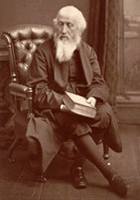William Barnes Biography
William Barnes was born at Blackmoor Vale in Dorset, the son of a farmer. He took a Bachelor of Divinity degree on a part-time basis at St. John's College, Cambridge, and became a clergyman in 1848. The poems he wrote about his birthplace on themes such as love, natural landscape and regional life brought him a lot of public acclaim. But he also had many other interests, especially languages. Apart from the classical languages, he also learned Welsh, Hindustani, Persian, Hebrew and a handful of European languages. His great interest in different kinds of knowledge made him write on different subjects such as mathematics, astronomy and geography. His real talent, however, lay in exploiting his poetic gift in the writing of folklore, thus setting the stage for people like Thomas Hardy.
As there I left the road in May,
And took my way along a ground,
I found a glade with girls at play,
By leafy boughs close-hemmed around,
...
News o' grief had overteaken
Dark-eyed Fanny, now vorseaken;
There she zot, wi' breast a-heaven,
While vrom zide to zide, wi' grieven,
...
'Ithin the woodlands, flow'ry gleaded,
By the woak tree's mossy moot,
The sheenen grass bleades, timber-sheaded,
Now do quiver under voot;
...
Up ste{'a}rs or down below,
I'll zit me in the lwonesome ple{'a}ce,
Where flat-bough'd beech do grow;
Below the beeches' bough, my love,
...
